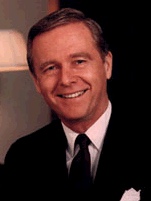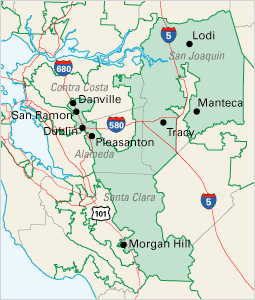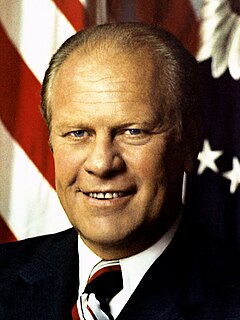
Edmund Gerald "Pat" Brown Sr. was an American politician and lawyer who served as the 32nd Governor of California from 1959 to 1967. Born in San Francisco, Brown had an early interest in speaking and politics; he earned a LL.B. degree in 1927, and subsequently began legal practice. His first elected office was as district attorney for San Francisco, he was elected attorney general of California in 1950 before becoming the state's governor in 1959. As governor, Brown embarked on massive projects, building important infrastructure and redefining the state's higher education system. He was never a serious contender in the national conventions, although frequently on primary ballots as California's favorite son. He lost his bid for a third term as governor in 1966 to future President Ronald Reagan, but his legacy has since earned him regard as the builder of modern California. His son Edmund G. "Jerry" Brown Jr. was the 34th and 39th Governor of California; his daughter, Kathleen Brown, was the 29th California State Treasurer.

Steven Paul Westly is an American venture capitalist and politician. He was the State Controller of California from 2003 to 2007 and was one of the top candidates in the Democratic primary for Governor of California in the 2006 election. He was defeated in the Democratic primary by California State Treasurer Phil Angelides, who later lost to Republican Governor Arnold Schwarzenegger in the November 2006 elections. During the 2008 Presidential Election, Westly served as California Campaign Co-chair for Obama for America and also as a member of Obama for America's National Finance Committee. Westly was briefly considered for a cabinet-level position in the Obama administration. Currently, Westly is a Managing Partner at The Westly Group, a clean technology venture capital firm he founded.
Edward E. Clark is an American lawyer and politician who ran for Governor of California in 1978, and for President of the United States as the nominee of the Libertarian Party in the 1980 presidential election.

The 1982 United States Senate elections were held on November 2, 1982. They were elections for the United States Senate following Republican gains in 1980. A total of four seats changed hands between parties, and the lone independent, Senator Harry Byrd Jr., retired. Democrats made a net gain of one seat in the elections. A special election in 1983 was then held after the winner of Washington's 1982 election died at the beginning of the term.

The 1978 United States Senate elections in the middle of Democratic President Jimmy Carter's term. Thirteen seats changed hands between parties. The Democrats at first lost a net of two seats to the Republicans, and then one more in a special election. Democrats nevertheless retained a 58-41 majority.

The 2006 California gubernatorial election occurred on November 7, 2006. The primary elections took place on June 6, 2006. The incumbent Republican Governor, Arnold Schwarzenegger, won re-election for his first and only full term. His main opponent was California State Treasurer Phil Angelides, the California Democratic Party nominee. Peter Camejo was the California Green Party nominee, Janice Jordan was the Peace and Freedom Party nominee, Art Olivier was the California Libertarian Party nominee, and Edward C. Noonan was the California American Independent Party nominee.

The 2005 United States elections were held on Tuesday, November 8. During this off-year election, the only seats up for election in the United States Congress were special elections held throughout the year. None of these congressional seats changed party hands. There were also two gubernatorial races, state legislative elections in two states, numerous citizen initiatives, mayoral races in several major cities, and a variety of local offices on the ballot.

The 1982 California gubernatorial election occurred on November 2, 1982. The Republican nominee, Attorney General George Deukmejian, narrowly defeated the Democratic nominee, Los Angeles Mayor Tom Bradley. Incumbent Governor Jerry Brown did not seek reelection to a third term.

The 1974 California gubernatorial election took place on November 5, 1974. The primary elections occurred on June 4, 1974. Incumbent Governor and former actor Ronald Reagan was retiring after two terms. Democratic Secretary of State Jerry Brown, son of former Governor Pat Brown, defeated Republican Controller Houston I. Flournoy in the general election.

The 2003 United States elections, most of which were held on Tuesday, November 4, were off-year elections in which no members of the Congress were standing for election. However, there were three gubernatorial races, state legislative elections in four states, numerous citizen initiatives, mayoral races in several major cities, and a variety of local offices on the ballot.

The 1970 Maine gubernatorial election took place on November 3, 1970. Incumbent Democratic Governor of Maine Kenneth M. Curtis chose to seek re-election. Curtis won a landslide victory in the Democratic primary. His general election opponent was Maine Attorney General James Erwin, the Republican nominee. Erwin had also easily won his respective party primary and received the Republican nomination for governor. Curtis narrowly defeated challenger in one of the tightest elections in Maine history – the final margin of victory was a mere 890 votes. Curtis received 163,138 votes (50.14%), while Erwin had 162,248 votes (49.86%).

The 1982 United States Senate election in California took place on November 2, 1982. Incumbent Republican U.S. Senator S. I. Hayakawa decided to retire after one term. Republican Pete Wilson won the open seat.

The 2014 California gubernatorial election was held on November 4, 2014, to elect the Governor of California, concurrently with elections for the rest of California's executive branch, as well as elections to the United States Senate in other states and elections to the United States House of Representatives and various state and local elections.

Redistricting in California has historically been highly controversial. Critics have accused legislators of attempting to protect themselves from competition by gerrymandering districts. Conflicts between the governor and the legislature during redistricting often have only been resolved by the courts.

In California state elections, 2014 was the first year in which the top statewide offices were elected under the nonpartisan blanket primary, pursuant to Proposition 14, which passed with 53% voter approval in June 2010. Under this system, which first went into effect during the 2012 election year, all candidates will appear on the same ballot, regardless of party. In the primary, voters may vote for any candidate, regardless of their party affiliation. The top two finishers, regardless of party, then advance to face each other in the general election in November.

The 1978 Alabama gubernatorial election took place on November 7, 1978, to elect the Governor of Alabama. Incumbent Democratic Governor George Wallace did not run for re-election. Fob James, a businessman who had switched from the Republican Party to the Democratic Party and campaigned as a "born-again Democrat", won the Democratic primary in an upset over Attorney General Bill Baxley. He went on to defeat Guy Hunt in a landslide in the general election. Incumbent Democrat George Wallace was term limited and could not seek a third consecutive term.

A general election was held in the U.S. state of Vermont on November 8, 2016. All of Vermont's executive officers were up for election as well as Vermont's Class III Senate seat and at-large seat in the United States House of Representatives. Primary elections were held on August 9, 2016.

The 1976 United States presidential election in Nevada took place on November 2, 1976, as part of the 1976 United States presidential election. Voters chose three representatives, or electors, to the Electoral College, who voted for president and vice president.
Statewide and municipal elections were held in the U.S. state of Virginia on November 7, 2017. The main election being held in Virginia was the state's gubernatorial election. In addition, all of Virginia's House of Delegates seats were up for re-election. Primary elections for the House of Delegates and the governor were held on June 13, 2017. Ralph Northam (D) was elected to become the 73rd Governor of Virginia, Justin Fairfax (D) was elected to become the 41st Lieutenant Governor of Virginia, and Mark Herring (D) was reelected as the 47th Attorney General of Virginia.

California state elections in 2018 were held on Tuesday, November 6, 2018, with the primary elections being held on June 5, 2018. Voters elected one member to the United States Senate, 53 members to the United States House of Representatives, all eight state constitutional offices, all four members to the Board of Equalization, 20 members to the California State Senate, and all 80 members to the California State Assembly, among other elected offices.






















